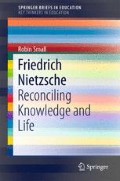Abstract
A uniquely radical thinker, Friedrich Nietzsche undermines the most basic beliefs and values of Western culture, and challenges his readers to find a new approach to both knowledge and life. He has a lot to say about education, directly and indirectly. Nietzsche’s personal path took him from a university career to the role of unattached public intellectual. As a dissenting professor, he criticises the narrowness of academic scholarship, the decline of school standards and the pressures put on teachers. All these problems arise from neglect of the true aims of education, represented in the humanistic concept of ‘culture’. Nietzsche’s ideas on education are strongly influenced by his own experiences as student and teacher. Our real educators, he thinks, are the intellectual and moral models we choose for inspiration and guidance. A committed educator himself, Nietzsche sought opportunities to realise his vision of the relation between teacher and learner, with mixed success.
Access this chapter
Tax calculation will be finalised at checkout
Purchases are for personal use only
References
Bain, A. (1880). Erziehung als Wissenschaft. Leipzig: F. A. Brockhaus.
Nietzsche, F. (1954). The Portable Nietzsche (W. Kaufmann, Ed. & Trans.). New York: The Viking Press.
Nietzsche, F. (1963). Kritische Gesamtausgabe: Werke (G. Colli & M. Montinari, Eds.). 36 vols. Berlin: Walter de Gruyter.
Nietzsche, F. (1966). Beyond Good and Evil: Prelude to a Philosophy of the Future (W. Kaufmann, Trans.). New York: Vintage Books.
Nietzsche, F. (1967). The Birth of Tragedy and The Case of Wagner (W. Kaufmann, Trans.). New York: Vintage Books.
Nietzsche, F. (1968). The Will to Power (W. Kaufmann & R. J. Hollingdale, Trans., W. Kaufmann, Ed.). New York: Vintage Books.
Nietzsche, F. (1969). On the Genealogy of Morals and Ecce Homo (W. Kaufmann, Trans.). New York: Vintage Books.
Nietzsche, F. (1974). The Gay Science (W. Kaufmann, Trans.). New York: Vintage Books.
Nietzsche, F. (1980). Kritische Studienausgabe: Sämtliche Werke (G. Colli & M. Montinari, Eds.). 15 vols. Berlin: Walter de Gruyter.
Nietzsche, F. (1982). Daybreak: Thoughts on the Prejudices of Morality (R. J. Hollingdale, Trans.). Cambridge: Cambridge University Press.
Nietzsche, F. (1983). Untimely Meditations (R. J. Hollingdale, Trans.). Cambridge: Cambridge University Press.
Nietzsche, F. (1986a). Human, All Too Human: A Book for Free Spirits (R. J. Hollingdale, Trans.). Cambridge: Cambridge University Press.
Nietzsche, F. (1986b). Kritische Studienausgabe: Sämtliche Briefe (G. Colli & M. Montinari, Eds.). 8 vols. Berlin: Walter de Gruyter.
Nietzsche, F. (2004). On the Future of Our Educational Institutions (M. W. Grenke, Trans.). South Bend, IN: St. Augustine’s Press.
Rée, P. (2003). Basic Writings (R. Small, Ed. & Trans.). Urbana-Chicago: University of Illinois Press.
Richardson, J. (1996). Nietzsche’s System. New York: Cambridge University Press.
Salin, E. (1948). Jakob Burckhardt und Friedrich Nietzsche (2nd ed.). Heidelberg: Verlag Lambert Schneider.
Schiller, F. (1967). On the Aesthetic Education of Man (E. M. Wilkinson & L. A. Willoughby, Trans.). Oxford: Clarendon Press.
Small, R. (2005). Nietzsche and Rée: A Star Friendship. Oxford: Clarendon Press.
Tönnies, F. (1897). Der Nietzsche-Kultus. Eine Kritik. Leipzig: O. R. Reisland.
Author information
Authors and Affiliations
Corresponding author
Rights and permissions
Copyright information
© 2016 The Author(s)
About this chapter
Cite this chapter
Small, R. (2016). Why Nietzsche Matters to Education. In: Friedrich Nietzsche. SpringerBriefs in Education(). Springer, Cham. https://doi.org/10.1007/978-3-319-29519-0_1
Download citation
DOI: https://doi.org/10.1007/978-3-319-29519-0_1
Published:
Publisher Name: Springer, Cham
Print ISBN: 978-3-319-29518-3
Online ISBN: 978-3-319-29519-0
eBook Packages: EducationEducation (R0)

